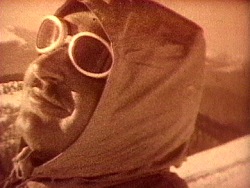Péter Forgács
Biography
Hungarian film and video maker Péter Forgács explores the historical and the cultural via the private. In a series of works entitled Private Hungary, Forgács recontextualizes archival home movies and film journals from the past, transforming private documents of everyday lives into haunting narratives of twentieth-century Hungary.
Forgács' works merge drama and anthropology, documentary and diary. His reclamation of amateur home movies and personal film journals from the 1920s to the 1960s results in subjective histories of Hungary during war and Communism, outside of "official" history.
Inevitably infused with a poignant, often elegiac aura, these works also set in motion questions of the relation of the home movie to narrative cinema and documentary film. As these once highly specific documents of everyday life move from the private into the public sphere, their subjects become ghosts of the past.
Forgács has long been engaged in investigating alternative historical and cultural narratives through the private documentation of the everyday. In 1983 he established the Private Film & Photo Archives, a unique collection of amateur films and snapshots of twentieth-century Hungary, for use in cultural and anthropological research.
Forgács has since 1978 worked at the Bela Balazs Film Studio in Budapest. In the same year he began collaborating with composer/musician Tibor Szemzo. Forgács, who also works in video installation and performance, has more recently produced a series of works that he terms "video operas."
Péter Forgács was born in 1950. He studied at the Academy of Fine Arts in Budapest, and was a researcher at the Hungarian Sociological Institute of the Hungarian Academy of Sciences. His works have been exhibited internationally, including the Sao Paolo Biennial, the Flaherty Film Seminar, and the Centre d'Art Contemporaine, Geneva. His video works are in the collections of The Museum of Modern Art, New York; Centre Georges Pompidou, Paris; Pacific Film Archives, Berkeley; Hungarian National Gallery, Budapest, among others. Forgács lives in Budapest. He has recieved awards from the Hungarian Film Festival in Budapest, the Grand Prize International Film Festival in New York, the Cannes Film Festival in France, the One World Human Rights Film Festival in Prague, the Marseilles International Document Film Festival in France, and the World Wide Video Festival in Holland among many others.
